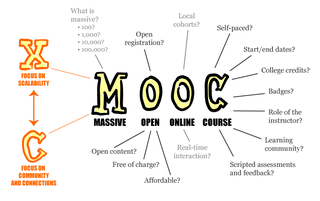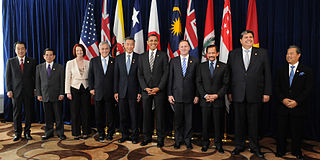
The Council on Foreign Relations (CFR), founded in 1921, is a United States nonprofit think tank specializing in U.S. foreign policy and international affairs. It is headquartered in New York City, with an additional office in Washington, D.C. Its membership, which numbers 4,900, has included senior politicians, more than a dozen secretaries of state, CIA directors, bankers, lawyers, professors, and senior media figures.
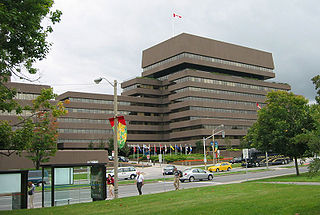
The foreign relations of Canada are Canada's relations with other governments and peoples. Britain was the chief foreign contact before World War II. Since then Canada's most important relationship, being the largest trading relationship in the world, is with the United States. However, Canadian governments have traditionally maintained active relations with other nations, mostly through multilateral organizations such as the United Nations, the Commonwealth of Nations, La Francophonie, the Organization of American States, and the North Atlantic Treaty Organization (NATO).

The Jerusalem Center for Public Affairs (JCPA) is an Israeli research institute specializing in public diplomacy and foreign policy founded in 1976. Currently, the Jerusalem Center for Public Affairs's research portfolio consists of five primary initiatives: the Institute for Contemporary Affairs (ICA), Defensible Borders Initiative, Jerusalem in International Diplomacy, Iran and the New Threats to the West, and Combating Delegitimization. More broadly, the think-tank concentrates on the topics of Iran, Radical Islam, the Middle East, Israel, the Peace Process, Jerusalem, Anti-Semitism, and World Jewry.

The Washington Quarterly is a magazine of international affairs covering topics and issues concerning global security, diplomatic relations, and policy implications. Founded by prestigious think tank, Center for Strategic and International Studies, TWQ is published by the George Washington University's Elliott School of International Affairs, in Washington, DC.
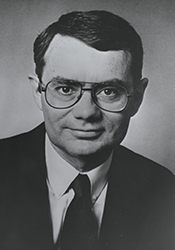
James (Jim) Bacchus. Mr. Bacchus currently serves as a Distinguished University Professor of Global Affairs and the Director of the Center for Global Economic and Environmental Opportunity at the University of Central Florida in Orlando, Florida, since September, 2017. He was a founding member and twice chairman of the Appellate Body of the World Trade Organization in Geneva, Switzerland from 1995-2003. Mr. Bacchus served as a former member of the U.S. House of Representatives from Florida from 1991-1995. Bacchus has served as Chairman of the Global Trade & Investment Practice Group at Greenberg Traurig, a Miami-based international law firm. He was also Co-Chair of its Global Practice Group. Bacchus has regularly written trade related articles[1][2][3][4] for publications including Forbes and The Wall Street Journal. On February 23, 2007, Bacchus was named to a Department of Defense panel reviewing the Walter Reed Army Medical Center neglect scandal.[5]
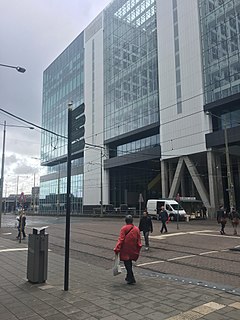
The Ministry of Foreign Affairs is the Dutch Ministry responsible for Foreign relations, Foreign policy, International development, International trade, Diaspora and matters dealing with the European Union, NATO and the Benelux Union. The Ministry was created in 1798 as the Department of Foreign Affairs of the Batavian Republic. In 1876, it became the Ministry of Foreign Affairs. The Minister of Foreign Affairs is the head of the Ministry and a member of the Cabinet of the Netherlands. The current Minister is Stef Blok. The Minister for Foreign Trade and Development Cooperation is a Minister without portfolio within the Ministry of Foreign Affairs. The current Minister is Sigrid Kaag.

International Affairs is a leading peer-reviewed academic journal of international relations. Since its founding in 1922 the journal has been based at Chatham House, the Royal Institute of International Affairs. With an impact factor of 2.952 and a ranking of 8th in the world in the 2017 ISI Journal Citation Reports, it is a highly regarded publication in the academic community for its combination of academic rigour and policy-relevance. It is published six times per year in print and online by Oxford University Press on behalf of Chatham House. In its long history International Affairs has featured work by some of the leading figures in global politics and academia; from Mahatma Gandhi and Che Guevara to Joseph S. Nye and Susan Strange

Lael Brainard is a member of the U.S. Federal Reserve's Board of Governors where she serves as Chair of the Committees on Financial Stability, Federal Reserve Bank Affairs, Consumer and Community Affairs, and Payments, Clearing and Settlements. She previously served as the United States Under Secretary of the Treasury for International Affairs in the administration of President Barack Obama and as Counselor to the Secretary of the Treasury from 2009 to 2013 where she received the Alexander Hamilton Award for her service. She was a senior fellow at the Brookings Institution from 2001 to 2009 and Vice President and Director of the Global Economy and Development Program from 2006 to 2009. She served as Deputy National Economic Adviser and Deputy Assistant to the President in the administration of President Bill Clinton. She previously was a member of the faculty at the Massachusetts Institute of Technology (MIT) Sloan School of Management and worked at McKinsey and Company.
The Center for International Relations (CIR) is a nonpartisan and nonprofit, tax exempt 501(c)(3) organization that publishes various materials about international relations and current affairs. The organization is based in the Washington, D.C. area, though its staff operates in various countries throughout the world.
In international relations, the term smart power refers to the combination of hard power and soft power strategies. It is defined by the Center for Strategic and International Studies as "an approach that underscores the necessity of a strong military, but also invests heavily in alliances, partnerships, and institutions of all levels to expand one's influence and establish legitimacy of one's action."
The Lakshman Kadirgamar Institute of International Relations and Strategic Studies (LKI) is a foreign policy think tank currently based in Colombo,Sri Lanka. The Hon. Minister of Foreign Affairs of Sri Lanka is ex officio the Chairman of LKI. LKI conducts independent research and functions as an autonomous organisation. LKI was established in 2006 and is named after the late Sri Lankabhimanya Lakshman Kadirgamar, P.C., M.P., and former Sri Lankan Foreign Minister. The Institute is the realisation of a goal actively pursued by the late Minister, to fulfill the country's need for a think tank in the field of foreign policy research and engagement. Its stated mission is ‘to engage in independent research of Sri Lanka’s international relations and strategic interests, and to provide insights and recommendations that advance justice, peace, prosperity and sustainability.’
Michael Paul Pillsbury is the American Director of the Center on Chinese Strategy, Hudson Institute, Washington, D.C., from 2014. He is the author of three books on China. The most recent one, The Hundred-Year Marathon, is an international bestseller and was number one on the Washington Post list, and a selection of the Commander, U.S. Special Operations Command, Commanders Reading List, in 2017, with Korean, Japanese, Taiwan-Chinese, PRC-Chinese, Hindi, and Mongolian editions also published. On September 26, 2018 U.S. President Donald Trump described Michael Pillsbury as "the leading authority on China.” On November 30, 2018 The New York Times, Politico and Bloomberg articles asserted Michael Pillsbury's importance of being one of Trump's top advisers on China.”,, According to The New York Times, "Ubiquitous on Fox News in recent months, Mr. Pillsbury’s book “The Hundred-Year Marathon: China’s Secret Strategy to Replace America as the Global Superpower” has become a lodestar for those in the West Wing pushing for a more forceful response to the threat that China’s rise poses to the United States."
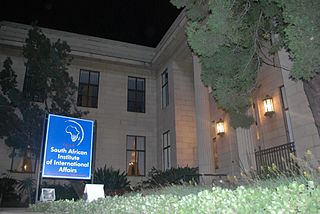
SAIIA is a South African research institute on regional and international issues. It is an independent, non-government think-tank whose purpose is to encourage wider and more informed awareness of the importance of international affairs.

Thomas O. Melia currently serves as Washington Director at PEN America. Previously, he served in the Obama Administration as USAID's Assistant Administrator for Europe and Eurasia and as Deputy Assistant Secretary of State in the Bureau of Democracy, Human Rights and Labor, at the United States Department of State, where his portfolio included Europe, South and Central Asia, the Middle East, and international labor rights. Melia previously served as Executive Director of Democracy International, an organization that designs, implements, and evaluates democracy and governance programs around the world. Melia also served as the Deputy Executive Director of Freedom House, the centrist bipartisan human rights organization launched in 1941 by Eleanor Roosevelt and others.
The Fletcher School of Law and Diplomacy is the graduate school of international affairs of Tufts University, in Medford, Massachusetts. Fletcher is well-ranked in its masters and doctoral international affairs programs. As of 2017, the student body numbered around 230, of whom 36 percent were international students from 70 countries, and around a quarter were U.S. minorities. The school's alumni network numbers over 9,500 in 160 countries, and includes ambassadors, diplomats, high ranking military officers, heads of nonprofit organizations, and corporate executives.

Suzanne Nossel is the executive director of PEN American Center, the largest of the 144 centers that form a loose federation that comprise PEN International. Her career has spanned government service and leadership roles in the corporate and non-profit sectors.
John Tirman is an American political theorist. Since 2004, Tirman has been executive director and principal research scientist at the MIT Center for International Studies. There he heads the Persian Gulf Initiative, which has conducted work on Iraq war mortality and U.S.-Iran relations, as well as other projects. He is author or coauthor of 13 books on international affairs, many of them exploring and advocating the “human security” paradigm in global affairs, and is a frequent contributor to AlterNet, The Huffington Post, and The Boston Globe.

Igor Alexandrovich Zevelev is a Russian political scientist who has worked as Professor of National Security Studies at the George C. Marshall European Center for Security Studies since 2017.

Dr. Faramarz Tamanna is the Director General of the Center for Strategic Studies of the Ministry of Foreign Affairs (Afghanistan) and meanwhile, chancellor of University of Afghanistan in Kabul . He holds his PhD from Jawaharlal Nehru University in International Studies and also from Tehran University in International Relations. Dr. Tamanna has previously worked as Deputy Spokesperson of the Ministry of Foreign Affairs and has held other positions in Afghan diplomatic missions abroad. He, also, has taught in several universities. He is the author of two books and tens of articles covering security and international relations.





